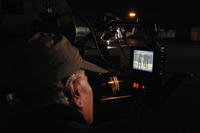Despite what you might have heard from other media, the Iraqi Army does not suck. In fact, by regional standards, it's a fine little army: well-armed, well-led and capable of defeating terrorists and insurgents in a stand-up fight. It wasn't always that way, but the coalition's clean-sheet approach and years of hard work by training teams has really paid off. But the Iraqi Army has two major weaknesses. First, its units are locally recruited, like the U.S. National Guard. This combined with Iraqis' overriding allegiance to tribe over nation means that most of them refuse to deploy when ordered to do so by Baghdad. Those units that have agreed to deploy, such as the highly disciplined Kurdish battalon sent to the Shiite town of Balad early this year, have been besieged in their forward operation bases by xenophobic locals.
But the Iraqi Army has two major weaknesses. First, its units are locally recruited, like the U.S. National Guard. This combined with Iraqis' overriding allegiance to tribe over nation means that most of them refuse to deploy when ordered to do so by Baghdad. Those units that have agreed to deploy, such as the highly disciplined Kurdish battalon sent to the Shiite town of Balad early this year, have been besieged in their forward operation bases by xenophobic locals.
But even if they were willing to deploy, most units are incapable of sustaining themselves far from their major bases for very long. This is the second major weakness. I go into detail in a new National Defense feature:
The [Iraqi] 10th Division is capable of planning and executing its own missions, but usually operates alongside British forces. The division, a light infantry formation, has four brigades each with two line battalions of 800 troops apiece, plus engineer and bomb disposal companies. Small divisional attachments including signals troops and military police are just now standing up with foreign assistance. There are currently no organic logistics troops.
This is consistent with the overall structure of the Iraqi Army. No more than 15 percent of Iraqs 120,000 soldiers are involved in logistics, U.S. Army Maj. Gen. Gerald Ostlund told the Associated Press. By contrast, Western armies feature more logisticians than combat troops.
"What you see is what you get," [British Army Lt. Col. Tim] Barrett says, referring to the 10th Division's infantry-heavy structure. While the battalions are adequately equipped with light arms and machine guns, there is a "desperate need" for vehicles, Lateef says. Currently, a handful of Russian-built medium trucks comprise the divisions major motor assets.
A dearth of vehicles plus a broader lack of logistical support means the 10th Division is incapable of sustaining operations away from its bases for more than a few hours, according to Barrett. This effectively limits it to urban operations in Basra and short sorties from a handful of rural installations.
What all this means is that the Iraqi Army will, for the time being, remain a local defense force. A good local defense force, mind you, but local nonetheless. So when Baghdad goes to shit, as it did a couple months back, the national government has few options for boosting the number of troops in the city. All it can do is try to recruit more troops locally ... and call for U.S. and British help.
--David Axe








